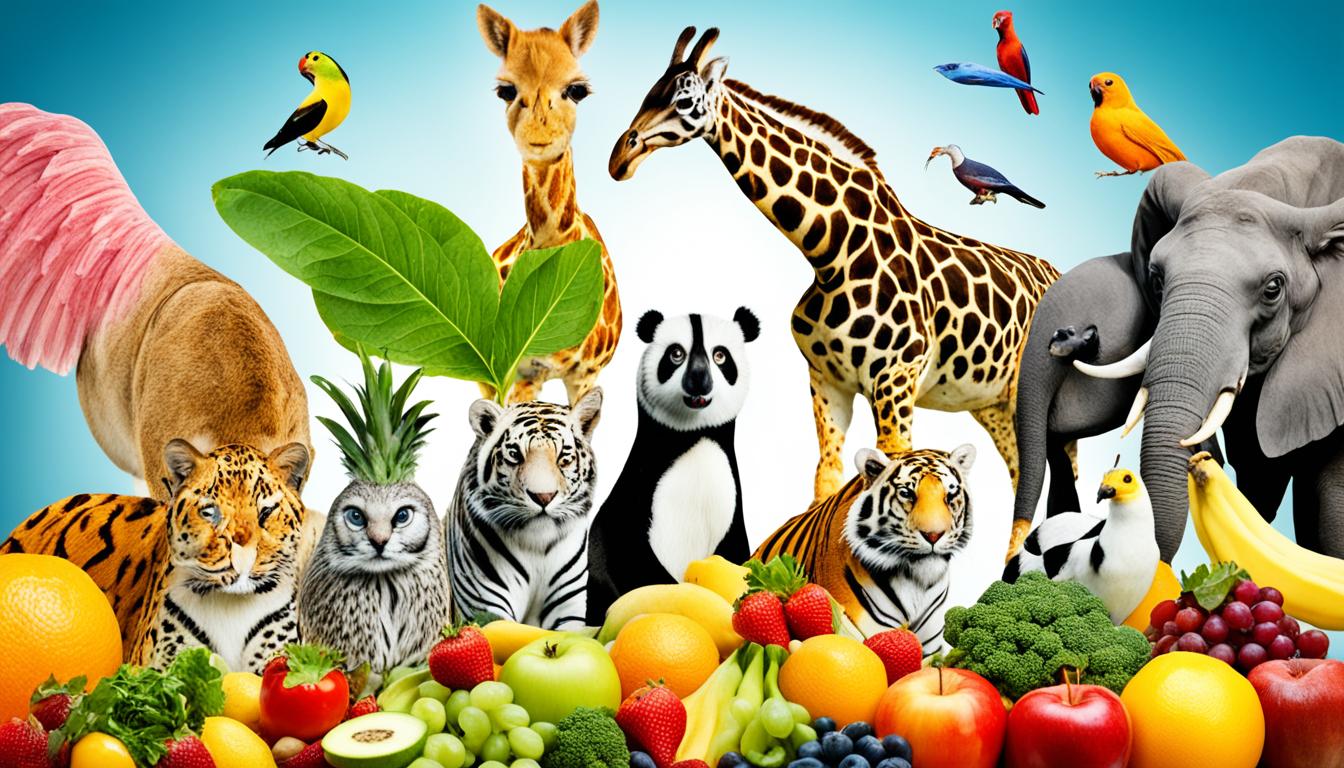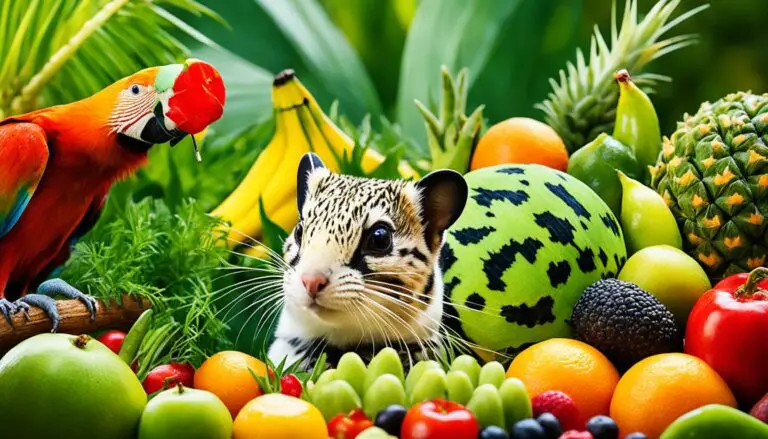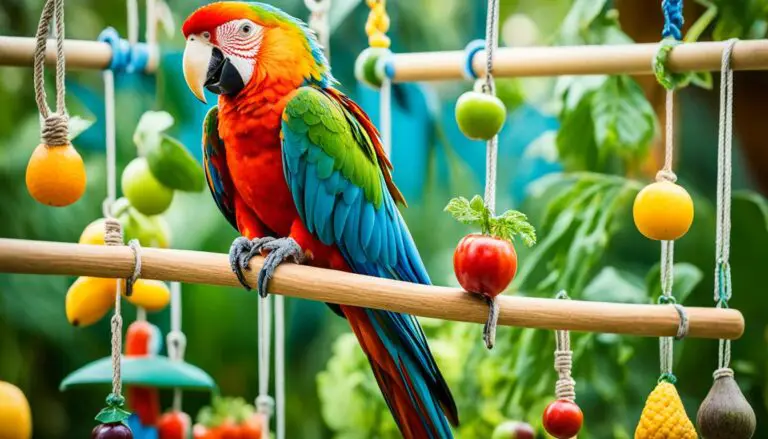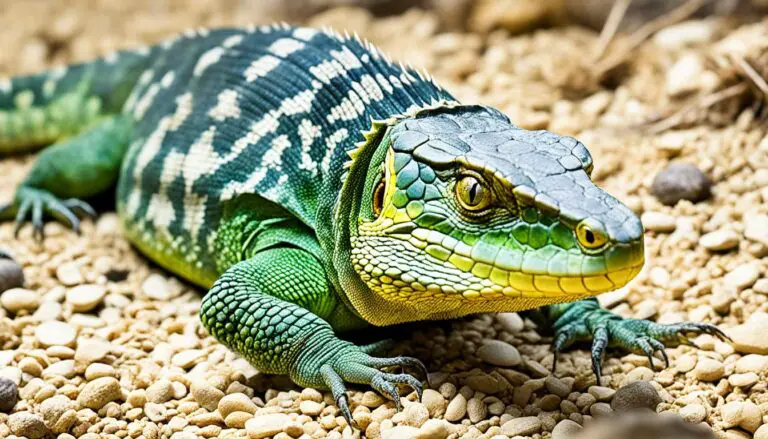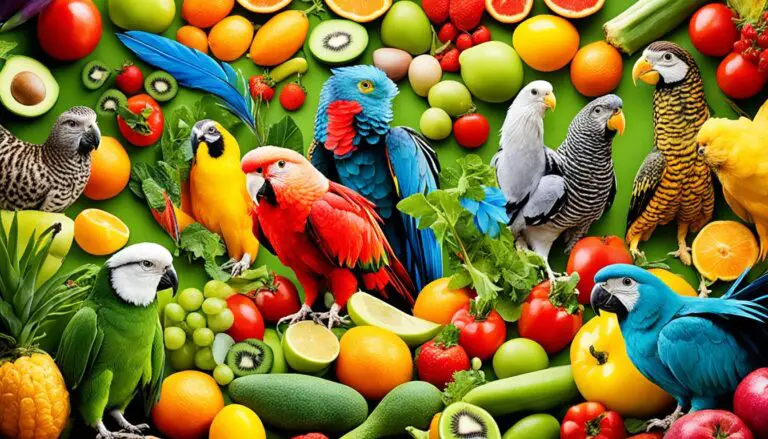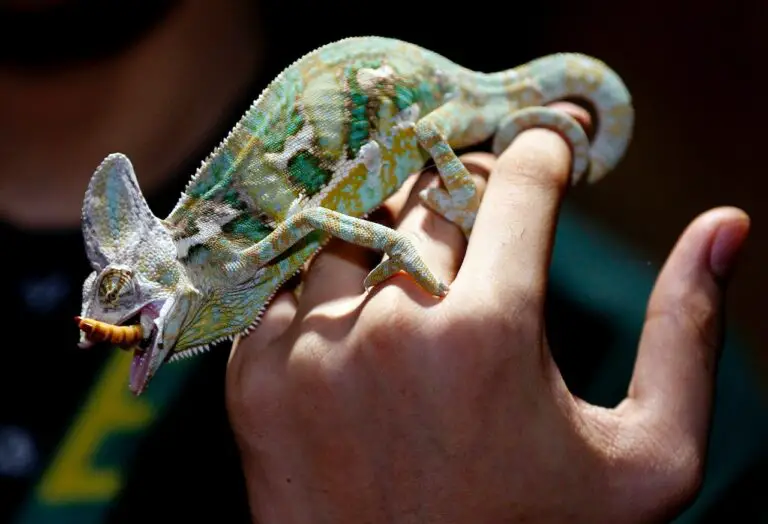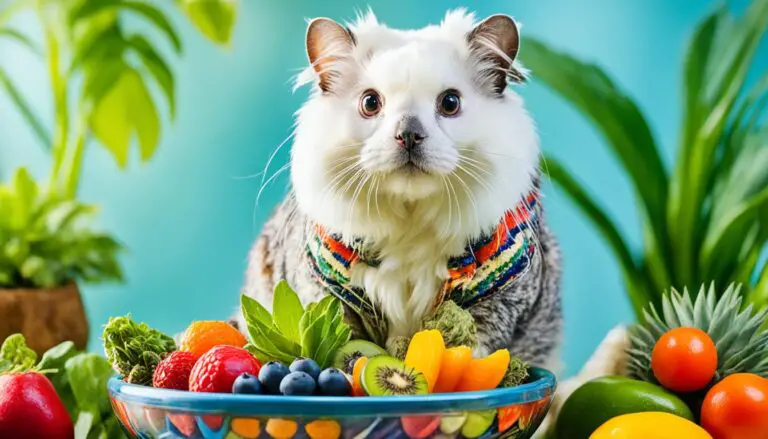Exotic Pet Nutrition Research & Diet Advancements
Have you noticed that more and more people worldwide are keeping pets? This is leading to a greater interest in pet food. Owners are eager to find the best food for their pets. Due to this, new studies and diet options have become available – especially for exotic pets.
One big focus of research is finding new sources of protein, like insects. These efforts help meet the increasing need for protein in pet food. They also look for ways to lessen the impact on the environment.
Key Takeaways:
- Increasing pet ownership has led to a higher demand for pet food and a focus on providing optimal nutrition for exotic pets.
- Research is being conducted to incorporate alternative protein sources, like insects, into pet food to support sustainability and minimize environmental impact.
- Exotic pets have specific dietary needs that require specialized diet formulations and careful consideration of nutrient requirements.
- The field of exotic pet nutrition research is continually evolving, with ongoing advancements in diet formulation and feeding strategies.
- Veterinary professionals play a crucial role in educating pet owners about optimal nutrition and ensuring the overall health and well-being of exotic pets.
The Trend Towards Premium and Natural Diets
Pet owners are becoming more aware of what they feed their pets. There’s a rise in the use of premium and natural diets. This change isn’t just for common pets. It’s also for those with unique needs like exotic pets.
Exotic pets are now being fed diets that are closer to what their ancestors ate. These diets are made to match pets’ natural, biological needs. They use natural foods without any fake stuff, aiming to boost the pets’ health.
There’s also a buzz around holistic and raw diets. These focus on the whole health of the pet. Raw diets, including raw meats, believe to be full of nutrients and enzymes that cooking might destroy.
The interest in top-quality and natural pet food is growing. This has led to new studies and trends in pet food. For instance, some are looking at how to add insects to exotic pets’ diets. This idea is both eco-friendly and healthy.
“Insects have the potential to revolutionize the way we feed our exotic pets. They are abundant, high in protein, and have a smaller environmental footprint compared to traditional animal farming,” explains Dr. Amanda Rodriguez, a renowned specialist in exotic pet nutrition.
| Benefits of Specialized Diets for Exotic Pets | Exotic Pet Nutritional Trends | Innovative Pet Diet Research |
|---|---|---|
| 1. Address specific dietary needs of exotic pets | 1. Natural, ancestral, and holistic diets | 1. Incorporating insects as a novel protein source |
| 2. Promote overall health and well-being | 2. Raw and unprocessed diets | 2. Advancements in pet food formulation |
| 3. Reduce the risk of nutrient deficiencies | 3. Sustainable and eco-friendly pet diets | 3. Ongoing research on exotic pet nutrition |
Owners are linking nutrition with their pets’ health. They choose diets that are not common but natural. By doing so, they help their pets live better and longer.

Reasons for Using Insects in Pet Food
Insects are becoming important in pet food for exotic animals. There are many good reasons for this change:
- Source of High-Quality Protein: Exotic animals need special kinds of food. Insects are full of top-notch protein. They provide essential amino acids that are key for the health of these pets.
- Sustainable and Eco-Friendly: Many are looking for eco-friendly pet food. Insects fit the bill perfectly. They need less land and water than traditional farming while producing less waste. Using insects helps us protect the planet.
- Exploring New Feeding Strategies: Figuring out what exotic pets need to eat is challenging. Including insects in their diet opens new doors. It allows for unique feeding methods tailored to the needs of each animal. Research is ongoing to learn more about these benefits.
Using insects in pet food helps in more ways than one. It’s good for the planet and helps us find new ways to feed exotic pets. This can improve their health and happiness.

The Importance of Exotic Animal Dietary Needs
Knowing and meeting the dietary needs of exotic pets is key to their well-being. These pets are unique and require specific nutrients. It’s up to us to give them a balanced diet that is also sustainable.
| Nutritional Benefits of Insects | Insects in Pet Food |
|---|---|
| High-quality protein | Source of essential amino acids |
| Rich in vitamins and minerals | Offers a unique taste |
| Environmentally friendly | Contributes to sustainable pet food options |
Nutritional Benefits of Insects
Exotic pets are getting new diets with a key ingredient: insects. This new diet idea is exciting and is based on the latest science. It shows that insects are an amazing choice for pets’ nutrition.
Insects are full of protein, just like soybean and meat. This makes them perfect for the health and growth of exotic pets. They help build and keep muscles strong. Plus, their protein is easy for pets to digest.
Insects also bring important amino acids to the table. These are critical for making enzymes, managing hormones, and keeping the immune system strong. So, feeding pets insects means they get all the key amino acids they need.
But it’s not just about protein. Insects also contain necessary vitamins and minerals. They offer vitamins like vitamin B12 and minerals like iron. These are vital for energy, cell health, immune support, and more.
What’s more, insects can introduce new and exciting tastes to pets. This makes their food more interesting and tasty. So, pets are more likely to enjoy and benefit from eating a variety of foods.
Incorporating insects into pet food is a big step for exotic pet owners. It means they can give their pets a well-rounded diet. With research always making new discoveries, insects are a key to pets’ health now.

Special Considerations for Exotic Pet Nutrition
Good nutrition is key for exotic pets to stay healthy and happy. These pets have unique diets. We need to think about what they eat carefully. Their food needs can change based on their species, and details like age, size, and if they’re having babies also matter.
People who care for exotic pets and vets want the best for them. They work hard to find out what these pets need to eat. This research improves the diets given to these special pets. It makes them healthier and happier.
We focus on what different types of exotic pets need to eat. We look for the best food for their health and growth. This new research helps us find diets that match their unique needs. We also learn what foods are good for them at every stage of life.
“Through exotic animal dietary studies, we have made significant breakthroughs in understanding the nutritional requirements of various species, enabling us to develop targeted diets that promote optimal health and longevity.” – Dr. Amanda Johnson, Exotic Animal Nutritionist
There are new ideas for what to feed exotic pets. Scientists are creating diets that are healthy and tasty. They use good ingredients like those found in the wild. This makes the food fun and good for the pets to eat.
Key Nutritional Considerations for Exotic Pets
| Dietary Consideration | Explanation |
|---|---|
| Specific Nutrient Requirements | Exotic pets might need different nutrients than regular pets. Research helps us find out what they need for good health. |
| Feeding Methods | Some exotic pets eat in special ways, like searching for food or hunting. Their diets must fit how they eat. |
| Food Presentation | How food looks and feels makes a big difference for exotic pets. This includes the texture and size of their meals. |
| Species-Specific Diets | Each kind of exotic pet has its own food needs. Studies help us know what these needs are. Then we create special diets for them. |
It’s very important to stay up-to-date on exotic pet diets. This knowledge is good for pet owners and vets. Owners can give their pets the best food by using the latest diet tips. Vets can offer advice based on the newest research to keep pets healthy.

Practical Considerations for Exotic Pet Nutrition
To feed your exotic pets right, pick high-quality food meant for their species. Good food should offer all they need, nutrition-wise. Owners must look for balanced diets that cover their pets’ unique dietary wants.
Owners must also learn about proper care and diet choices for their exotic friends. Understanding portion sizes, feeding times, and the need for a regular diet is important. This helps keep digestive issues and nutrient problems at bay.
Vet help is key in making sure exotic pets eat well. Owners should consult them to get the latest diet tips for their pets. Working with a vet ensures pets meet their dietary and health needs.
“It is important for exotic pet owners to consult with a veterinarian experienced in exotic pet care to address any specific nutritional concerns and to seek guidance on appropriate dietary choices for their pets.”
Continual Innovations in Exotic Pet Nutrition
Research in pet food keeps coming up with new ways to feed exotic animals. Experts always look for ways to meet their unique diet needs. This has brought on new special pet foods made just for them.
These new diets aim to make pet foods richer and better balanced. They also try out new ways to make them tastier and healthier. This way, pets get the best of what they need to eat.
One focus of research is finding new ways to feed exotic pets for their health. Things like adding insects to their food can help promote a healthy and nutritious diet.
Incorporating Insects into Exotic Pet Diets
Insects are now seen as a good way to give pets protein. They are full of what pets need to stay healthy. Using insects in food is also good for the environment.
Research into new ways to feed pets looks at how insects can help. Scientists work on making foods that use insect proteins. These can meet the different needs of exotic pets.
By adopting these new ways to feed pets, owners can give them a rich, balanced diet. This diet supports their unique food needs.
| Nutritional Benefits of Incorporating Insects into Exotic Pet Diets |
|---|
| Insects provide high-quality protein, similar to soybean and meat meal. |
| Insects are rich in essential amino acids, vitamins, and minerals. |
| Insects have high digestibility, ensuring optimal nutrient absorption. |
| Insects offer a unique taste profile, potentially appealing to exotic pets. |
Owners can support their exotic pets’ health by following new research. Using insect protein is a big part of this. It gives pets a diet that’s both nutritious and good for the planet.
Ethical Considerations in Exotic Pet Nutrition
When caring for exotic pets, ethical nutrition is crucial. Good owners do their homework to feed their pets right. They create a good home, add to their pet’s life, and make sure they eat well. This is vital for the pets’ happiness and health.
One issue in exotic pet care is whether to clip pet birds’ wings. This stops them from flying away but takes away their natural ability. Some think it keeps them safe, while others see it as a loss for the bird. Vets have to think hard about what’s best for the bird and its owner.
Improving how we feed exotic pets and finding new ways to feed them is key. With the latest info on feeding exotic pets, owners and vets can give the best care.
“A good diet for exotic pets does more than just feed them. It keeps them healthy and happy. We need to think about what they naturally eat and their behavior.” – Dr. Emily Jones, Exotic Pet Veterinarian
Creating Enriching Diets
When we feed exotic pets, we need to think about what they’d eat in the wild. Studies show that giving them a varied, natural diet is good for their mind and stops bad habits. This is important because exotic pets can get bored or stressed in captivity.
Adding different tastes, textures, and ways to eat is called an enrichment diet. It mimics how they find and eat food in nature. This could mean feeding them live prey, using puzzle feeders, or hiding food in toys. These methods keep them sharp and active.
Supporting Animal Welfare
Good nutrition for exotic pets is tied to their welfare. Owners and vets have to make sure these unique pets eat right. They also must see the pets live a good life.
By following the best feeding practices and using new science in pet nutrition, owners can help their pets thrive. This means knowing what their pets need to eat, using good food, and adding extra nutrients where needed.
And it’s also about keeping up with the latest in exotic pet nutrition through teamwork. Owners, vets, and experts coming together can create the best ways to feed and care for exotic pets. This effort is how we make sure these pets are as healthy and happy as they can be.
Veterinary Care for Exotic Pets
Veterinary care for exotic pets is very specialized. Owners of exotic pets don’t always visit the vet as often as usual. They often come in during emergencies or with injuries.
Vets need to know how to handle exotic pets, which are different from dogs and cats. This means they have to understand what makes these animals tick. They also inform pet owners about feeding and looking after their exotic pets.
Specialized Expertise for Exotic Pets
Consulting a vet with special knowledge in exotic animals is key. They have a good understanding of these animals’ needs. This means they can figure out and treat any health problems, and show how to best care for them.
Research on exotic pet health has given us a lot of important information. It helps us know the major health issues and how to treat them. This makes sure that vets have the latest knowledge in caring for exotic pets.
Innovative Pet Nutrition Studies
Nutrition is very important for exotic pets. Studies have looked into what they need to stay healthy. This has led to better diets and nutrition for exotic pets.
Researchers closely study what kinds of food are best for these pets. They then recommend the right diets. This helps keep the pets healthy and happy.
Providing Comprehensive Care
Exotic pets need great care. This means vets should do more than just treat illnesses. They should discuss the best way to take care of these unusual pets. This includes how to feed them and set up their homes.
Proper care goes beyond just food. It’s also about where they live. This information helps make sure their home is the right one for them.
It’s also important for pet owners to learn about diet. New studies help guide owners in choosing the right food. These studies help pick the best foods and amounts for exotic pets.
Bringing together unique expertise, the latest in nutrition, and great care plans, we get a total approach. This helps keep exotic pets healthy. It covers everything from getting sick to staying well, for a great life with their families.
Conclusion
The study of what exotic pets eat is always growing. People who own these pets and vets are finding new ways to keep them healthy. They do this through research on what to feed these unique animals.
Adding insects to pet food is a good idea. It’s good for the pets and the planet. Insects are rich in protein, which is great for pets. They also use less land and water, and you can feed them food waste. This means they are a green choice.
Learning and sharing what we know about exotic pet food is very important. It helps us keep up with new findings and the best ways to feed these animals. This way, we make sure they are happy and healthy.
The main aim is to give exotic pets a diet that meets all their needs. By using what we learn and looking for new ideas, we can make their lives better. This is good for both the animals and the people who care for them.
FAQ
What is the importance of exotic pet nutrition research and diet advancements?
What are the trends in exotic pet nutrition?
Why are insects being considered as ingredients in pet food?
What are the nutritional benefits of incorporating insects into pet diets?
What are the special considerations for exotic pet nutrition?
What are the practical considerations for exotic pet nutrition?
What ethical considerations should be kept in mind for exotic pet nutrition?
What is the importance of veterinary care for exotic pets?
What is the significance of exotic pet feeding strategies and innovative diet research?
Source Links
- https://www.mdpi.com/2076-2615/12/11/1450
- https://www.msdvetmanual.com/management-and-nutrition/nutrition-exotic-and-zoo-animals/nutrition-exotic-and-zoo-animals
- https://todaysveterinarynurse.com/exotic-medicine/unique-and-unusual-exotic-animal-medicine/
Peter Stones is the founder of Exotic Pets Place, the leading online resource for exotic pet care information.
With over 10 years of hands-on exotic pet ownership experience, he is deeply passionate about sharing his expertise to help others properly care for their unusual pets.
When he's not writing extensively researched articles or connecting with fellow exotic pet enthusiasts worldwide, you can find Peter at home tending to his own beloved menagerie of exotic animals.

